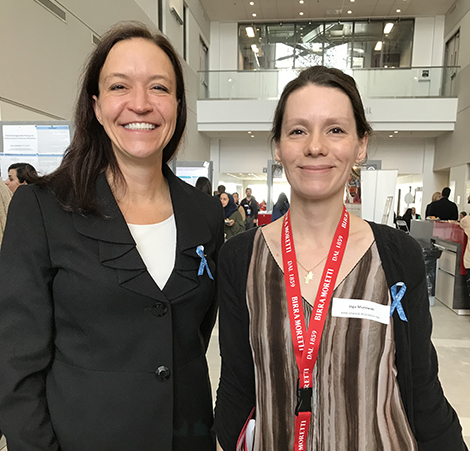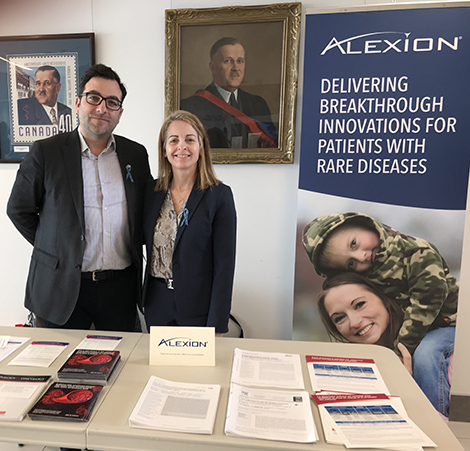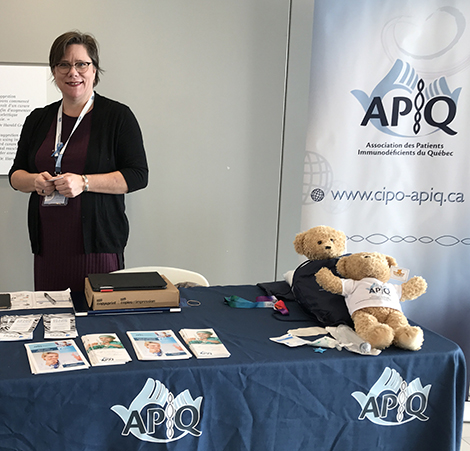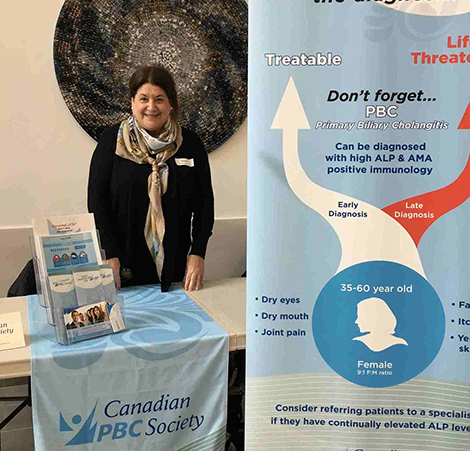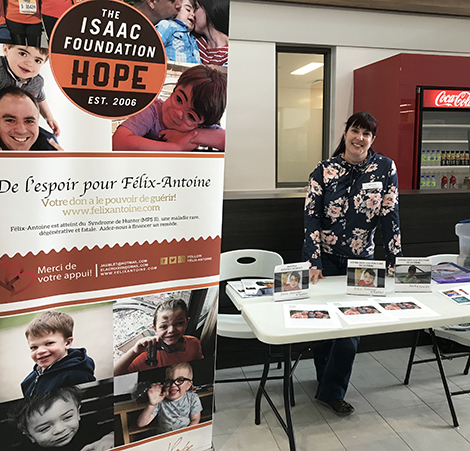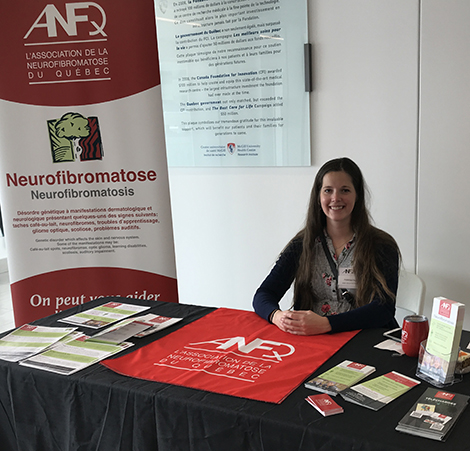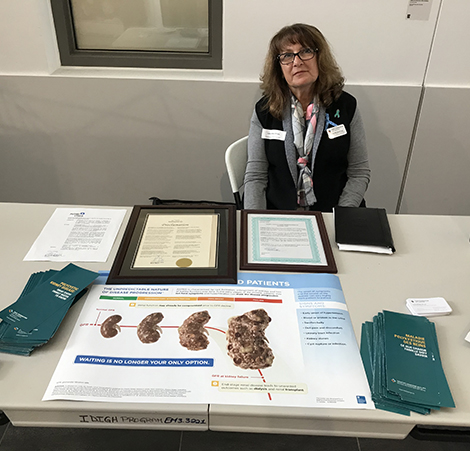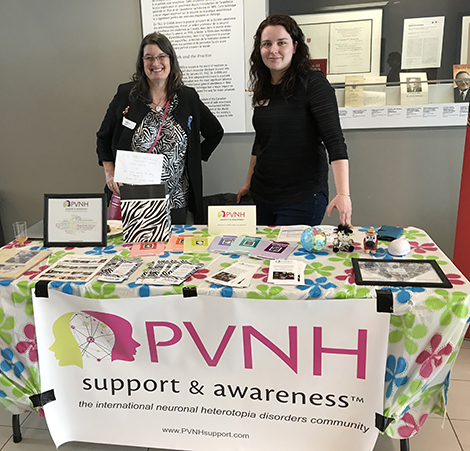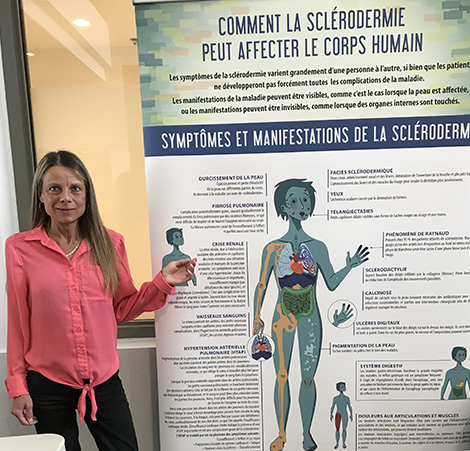
Fil d'Ariane
- Nouvelles et événements
- Nouvelles
- Content
- Nos soins pour la rareté
null Nos soins pour la rareté
Des chercheurs, porte-paroles et patients se rassemblent pour la Journée de la recherche sur les maladies rares à l’IR-CUSM
6 mars 2020
Source : IR-CUSM. Le 28 février dernier, le Consortium de recherche sur les maladies rares à l’Institut de recherche du Centre universitaire de santé McGill (IR-CUSM) a organisé une demi-journée pour présenter les programmes cliniques et les programmes de recherche axés sur les maladies rares.
Pourquoi se soucier des maladies rares? Mondialement, on estime que plus de personnes sont touchées par des maladies rares (350 millions) que le VIH (36,9 millions). De plus, comme l’explique le Dr Don Vinh, « les maladies rares, surtout les maladies à base génétique, fournissent un modèle humain permettant de définir les mécanismes biologiques des maladies humaines. » L’événement de 2020 a attiré 160 participants du réseau du Centre universitaire de santé McGill, y compris des scientifiques de recherche fondamentale, des cliniciens-chercheurs avec des spécialisations pédiatriques et adultes, des stagiaires et du personnel de recherche. Des patients et des représentants de groupes de porte-paroles de patients et de fondations sur les maladies rares ont également participé à l’événement pour partager leur expérience et en apprendre davantage sur les dernières recherches.
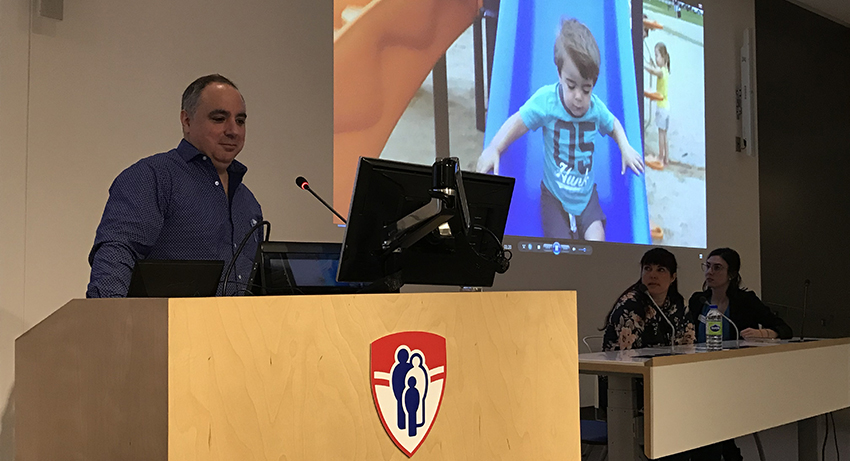
Le succès de l’événement de cette année fut assuré par son maître de cérémonie, le journaliste et la personnalité radio et télé Yvan Martineau, qui est également patient au CUSM. L’expérience de M. Martineau avec un trouble immunologique rare d’abord identifié comme un symptôme d’asthme sévère l’a convaincu de devenir un porte-parole enthousiaste pour la recherche sur les maladies rares.
« Chaque pneumonie signifiait deux semaines d’hospitalisation et des pertes de salaire pour moi, explique M. Martineau. Maintenant, je me soigne avec des médicaments oraux, sans hospitalisation. » Il affirme qu’une équipe dévouée de cliniciens lui a sauvé la vie, il est donc honoré de redonner en participant à la Journée de la recherche sur les maladies rares.
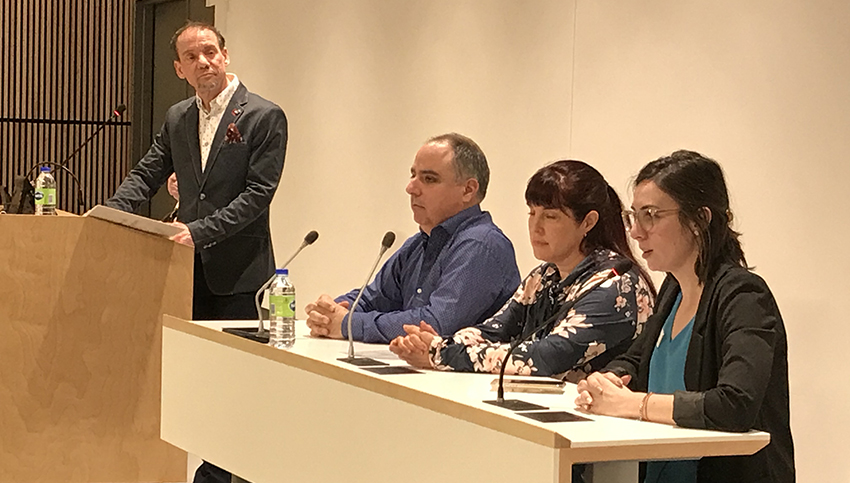
Le réseautage avec des groupes de porte-paroles et des fondations a donné un élan à l’événement, tout comme une solide liste de conférenciers. Le programme de 2020 présentait le travail de la Dre Genevière Bernard, une experte de renommée mondiale sur les lésions de la substance blanche déterminées génétiquement, plus précisément les leucodystrophies. La Dre Danica Stanimirovic du Conseil national de recherches (CNRC) a présenté un projet qui appuie le développement de versions abordables de thérapies géniques au Canada grâce à un nouveau programme fédéral.
Un autre invité spécial fut le Dr Bill Gall des National Institutes of Health (NIH) aux États-Unis, qui a parlé du Undiagnosed Disease Program. L’objectif de ce projet, a-t-il expliqué, est d’établir le phénotype de patients atteints de nouvelles maladies rares n’ayant aucun diagnostic de maladie. Ce programme aide également à découvrir et identifier de nouveaux gènes causant des maladies, ce qui aide en parallèle les cliniciens et chercheurs à en apprendre davantage sur les types de mutations causant une maladie.
Aider une communauté qui est souvent incomprise
Lorsqu’on a demandé à la clinicienne-chercheuse Dre Nancy Braverman comment la recherche sur les maladies rares avait évolué au cours des dernières années, elle a répondu que « c’est une période excitante, puisque de plus en plus de thérapies sont au stade des essais cliniques. Les fondations collaborent régulièrement avec nous. Et nous pouvons maintenant nous concentrer sur l’accès et des thérapies supplémentaires pour aborder toutes les maladies. » En observant plus de 27 présentations par affiches d’étudiants aux cycles supérieurs, de boursiers postdoctoraux et de membres du personnel de recherche et du personnel clinique, elle ajoute : « Il est emballant de voir les étudiants et leur excitation alors qu’ils donnaient leurs présentations! »

Travailler sur la recherche sur les maladies rares signifie d’aider une communauté qui est souvent incomprise, selon Aaron Sphar, un étudiant aux cycles supérieurs supervisé par la Dre Geneviève Bernard. « En combinant la technologie de pointe et les groupes de porte-paroles, explique-t-il, nous sommes mieux outillés pour aider ces personnes ayant des besoins uniques en termes de soins. »
La Dre Aurélie Tréfier Trindade, une stagiaire postdoctorale supervisée par le Dr Arnold Kristof à l’IR-CUSM, a participé à la séance de présentation orale. « Cette Journée de la recherche sur les maladies rares était une belle occasion de présenter aux patients la manière dont la science évolue au quotidien, et de démontrer comment ils sont maintenant des alliés essentiels en recherche, explique-t-elle. » Son travail postdoctoral vise à développer de nouvelles thérapies pour la lymphangioléiomyomatose (LAM), une maladie pulmonaire rare.
Perspectives gagnantes
Deux prix pour des résumés furent remis lors de l’événement. Le prix pour la meilleure présentation orale de trois minutes fut remporté par Wajih Jawhar, un étudiant aux cycles supérieurs supervisé par les Dres Nada Jabado et Livia Garzia à l’IR-CUSM. Isabelle Carrier, qui travaille avec le Dr Roderick McInnes à l’Institut Lady Davis et avec les Dres Loydie Jerome-Majewska et Myriam Srour à l’IR-CUSM, a remporté le prix pour la meilleure présentation par affiche.
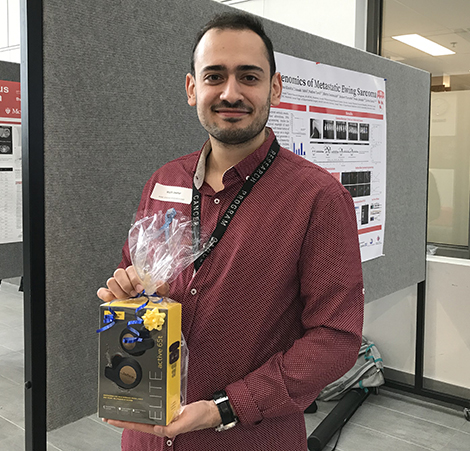
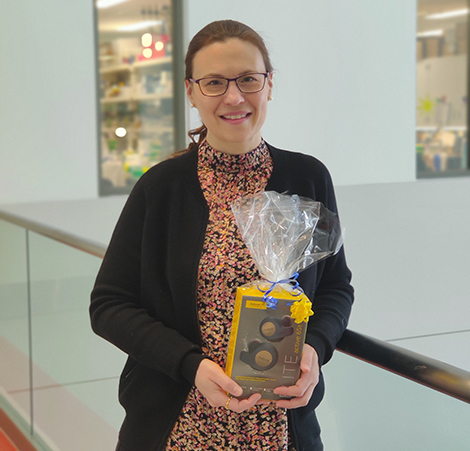
Wajih Jawar a déclaré qu’il considère la recherche sur les maladies rares importante en raison de son « profond impact sur l’humanité », un défi auquel il se sent choyé de prendre part. « Je peux apporter mon aide, peu importe où je me trouve, dit-il, et où les patients se trouvent. »
Entendre les expériences de patients atteints de maladies rares est le plus grand stimulant pour les chercheurs en laboratoire, selon Isabelle Carrier. « La plupart des patients atteints de maladies rares espèrent un remède dans les premières semaines, et les témoignages qu’ils ont livrés lors de la Journée de la recherche sur les maladies rares étaient désolants, dit-elle. La recherche, surtout à l’aide de modèles de souris, prend des mois et des années à compléter, et c’est pourquoi la recherche sur les maladies rares a inspiré notre laboratoire à trouver des réponses à nos questions de recherche le plus rapidement possible. »
Remerciements
Nous tenons à remercier le comité d’organisation et la direction du Consortium de recherche sur les maladies rares pour leur travail acharné dans la planification de l'événement cette année : Dr. Donald Vinh, Ms. Melanie Langelier, Dr. Arnold Kristof, Dr. Nancy Braverman, Dr. John Mitchell, Dr. Myriam Srour, and Dr. Bettina Mucha-Le Ny. Cette journée de la recherche multidisciplinaire n'aurait pas été possible sans la précieuse collaboration des programmes en SEDH, en MIISM et de RESP de l'IR-CUSM, ainsi que le soutien de leur équipes administratives respectives pour le bon déroulement de la journée.
Des remerciements spéciaux pour tous nos partenaires!
Les organisateurs souhaitent remercier tous les participants à la Journée de la recherche sur les maladies rares. Nous remercions spécialement nos commanditaires ci-dessous et les fondations, les groupes de porte-paroles des patients et les patients qui ont partagé leur expérience aujourd’hui.
- SHUa Canada : Syndrome Hémolytique et Urémique atypique
- Association des Patients Immunodéficients du Québec
- Fondation HTAPQ – hypertension artérielle pulmonaire du Québec
- Réseau canadien des NMP
- Société canadienne de la Mastocytose
- Fondation du Centre universitaire de santé McGill
- Fondation de l’Hôpital de Montréal pour enfants
- Sclérodermie Québec
- PVNH Support and Awareness
- Fondation canadienne de la MPR
- L’Association de la neurofibromatose du Québec
- McGill’s Rare Disease Interest Group
- Regroupement Québécois des Maladies Orphelines
- Société canadienne de la CBP
- The Isaac Foundation
À propos du Consortium de recherche sur les maladies rares du CUSM
Le Consortium de recherche sur les maladies rares réunit les cliniciens et les chercheurs travaillant sur les maladies rares. Au plan clinique, notre objectif est d’optimiser les soins médicaux et la prestation de soins de santé chez les populations pédiatriques et adultes, y compris la création d’un corridor de service pour faciliter les recommandations et les soins de transition pour tous les âges. Au plan scientifique, les objectifs du consortium comprennent l’intégration de l’expertise en recherche pluridisciplinaire, l’expansion de biobanques, l’implémentation de génomique de pointe pour le diagnostic et les partenariats avec l’industrie pour des essais précliniques et cliniques.
